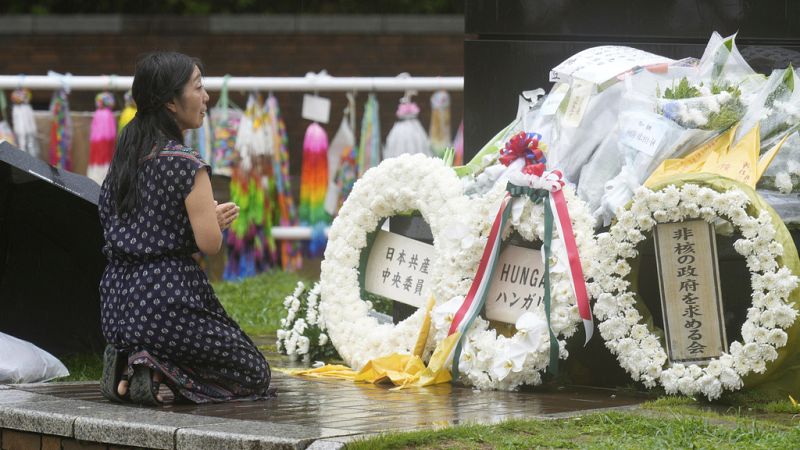Nagasaki remembers atomic bomb victims 80 years on with minute of silence

A minute of silence was observed Saturday in Nagasaki, precisely at the time of the atomic bomb explosion dropped by a US bomber on the Japanese city 80 years ago, while the restored bell tower of the city’s church rang for the first time since.
On 9 August 1945, at 11:02 am, just three days after Hiroshima, Nagasaki was struck by the horror of a nuclear attack.
Some 74,000 people lost their lives in the city, a major port in the southwestern part of Japan, adding to the 140,000 deaths of Hiroshima.
“Eighty years have passed, and who would have imagined the world would come to this? Stop armed conflicts immediately!” urged Shiro Suzuki, mayor of Nagasaki, during the ceremony attended by representatives from over 100 nations.
“Conflicts are escalating across various regions due to the vicious cycle of strife and division," Suzuki said.
"A crisis capable of threatening the very survival of humanity itself — such as nuclear war — looms over all who inhabit this planet,” he emphasised just before the minute’s silence was observed.
International participation — a record turnout — was notably marked by the presence of Russia, which had not attended the anniversary since its full-scale invasion of Ukraine in February 2022.
Israel, whose ambassador was excluded last year in protest of the war in Gaza — prompting a boycott by other G7 ambassadors — was present this time.
That explosion feels as though it happened "in ancient times, but for those who lived through it, it is as fresh as yesterday. We must keep alive the memory of these real events,” said Atsuko Higuchi, a 50-year-old Nagasaki resident, at the city's Peace Park.
A symbol of this memorial is one of the cathedral's two bells, destroyed by the atomic bomb: it was restored in the spring by US faithful and placed beside the existing bell before ringing once more on the anniversary, for the first time in 80 years.
The red-brick Cathedral of the Immaculate Conception stands atop a hill. Rebuilt in 1959, the building was obliterated when the bomb exploded just a few hundred metres away.
The second of the two bells was recovered from the ruins.
Passing down lessons
Ageing survivors and their supporters in Nagasaki now put their hopes of achieving nuclear weapons abolition in the hands of younger people, telling them the attack isn't distant history, but an issue that remains relevant to their future.
“There are only two things I long for: the abolition of nuclear weapons and prohibition of war,” said Fumi Takeshita, an 83-year-old survivor. “I seek a world where nuclear weapons are never used and everyone can live in peace.”
In the hope of passing down the lessons of history to current and future generations, Takeshita visits schools to share her experience with children.
“When you grow up and remember what you learned today, please think what each of you can do to prevent war,” Takeshita told students during a school visit earlier this week.
Teruko Yokoyama, an 83-year-old member of a Nagasaki organisation supporting survivors, said that she thinks of the growing absence of those she had worked with, and that fuels her desire to document the lives of others who are still alive.
The number of survivors has fallen to 99,130, about a quarter of the original number, with their average age exceeding 86. Survivors worry about fading memories, as the youngest of the survivors were too young to clearly recall the attack.
“We must keep records of the atomic bombing damages of the survivors and thier lifetime story,” said Yokoyama, whose two sisters died after suffering illnesses linked to radiation.
Her organisation has started to digitise the narratives of survivors for viewing on YouTube and other social media platforms with the help of a new generation.
“There are younger people who are beginning to take action,” Yokoyama told AP on Friday. “So I think we don’t have to get depressed yet.”
Nagasaki hosted a “peace forum” on Friday where survivors shared their stories with more than 300 young people from around the country. Seiichiro Mise, a 90-year-old survivor, said that he's handing seeds of “flowers of peace” to the younger generation in hopes of seeing them bloom.
Japan's security dilemma
Survivors have become increasingly frustrated by a growing nuclear threat and support among international leaders for developing or possessing nuclear weapons for deterrence.
They criticised the Japanese government’s refusal to sign or even participate in the Treaty on the Prohibition of Nuclear Weapons as an observer because Japan, as an American ally, says it needs US nuclear possession as deterrence.
In his speech in Nagasaki on Saturday, Prime Minister Shigeru Ishiba reiterated Japan’s pursuit of a nuclear-free world, pledging to promote dialogue and cooperation between countries with nuclear weapons and non-nuclear states at the Non-Proliferation of Nuclear Weapons review conference scheduled for April and May 2026 in New York. Ishiba didn't mention the nuclear weapons ban treaty.
“Countries must move from words to action by strengthening the global disarmament regime,” with the Treaty on the Non-Proliferation of Nuclear Weapons, or NPT, at the centre, complemented by the momentum created by the nuclear weapons ban treaty, said UN Secretary-General António Guterres, in his message read by Under-Secretary-General Izumi Nakamitsu in Nagasaki.
Nagasaki invited representatives from all countries to attend the ceremony on Saturday. The government in China has notably notified the city that it will not be present without providing a reason.
The ceremony last year stirred controversy because of the absence of the US ambassador and other Western envoys in response to the Japanese city’s refusal to invite officials from Israel.
Today

